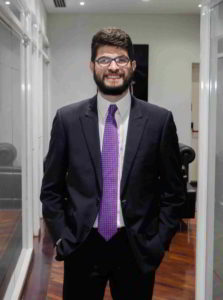Questions and answers around the revival of the economy
Juan Carlos Apitz, member of the management staff of Intelinvest, points out that the economy is waiting for a stabilization of the indicators, after all efforts are focused on attacking the pandemic
In a conversation with the manager of alternative markets of Intelinvest, lawyer Juan Carlos Apitz Ardizzone, on behalf of the Stock House, analyzed for the Digital Communication Group EL SUMARIO, its users and readers, the circumstances that surround the widespread aspiration to reactivate the economy.
“We all know the same about the past and ignore the same about the future,” writes Howard Marks in his April 14 memo. No one has a magic wand, and while we would like to find certainty in past events, nothing compares to a pandemic of this magnitude. Despite global efforts to revive the economy, there are still many questions to face. And thus, Apitz Ardizzone begins his analysis.
“President Donald Trump is on a crusade to revive the American economy; he does not consider that quarantine can be maintained for much longer. The latest data from the US Conference Board show the accelerated deterioration of the US economy, while households remain in mandatory quarantine. The number of unemployed in the United States reaches more than 20 million, and the country has already ended the bullish rally that started in the 2008 global financial crisis.”
In his memo, Marks, the member of the Intelinvest team underlines, points out that the American nation is experiencing: 1) the most severe pandemic since the Spanish Flu —about 102 years ago—, 2) the most difficult economic contraction since the great depression in 1930, 3) the steepest drop in oil prices since the creation of OPEC and 4) the largest government intervention in the last century.
Overcoming COVID-19 seems to be the priority of all leaders, but the data regarding the pandemic does not help an orderly reactivation. And then appears one of the first questions: is it possible to reach an orderly revival?
The economy and the ethical dilemma
Juan Carlos Apitz continues. “Reactivation will put many infected people in environments where other people, especially the vulnerable population, could also contract the virus. As a society, we are faced with the question of how many lives we will stop saving because of the desire to reactivate the economy. The cost of living for thousands is the cost we must bear for the economic stability of millions of people?
“According to an article by investor Edward Lampert in The New York Sun, thousands of people die in car accidents, but still, the benefit of allowing the transportation of goods and products is far greater than the cost of road accidents.”
Now, are we really prepared to assume the consequences of a normalization of activities? I do not know if as a society we can think and discuss this trade-off. There is no magic formula and it is possible that there is still a long way to go
Intelinvest’s lawyer and manager of alternative markets points out that the economy has experienced an external shock due to the exponential infection of the world population, despite the fact that some vulnerabilities already existed which made industrialized economies prey for any unforeseen event. However, since the economy responds, in a very specific and short-term way, to the development of COVID-19, an economic reactivation cannot be planned if the curve of infected people has not decreased and the danger of infection remains latent.

“While in European countries the curve begins to decline, it is paradoxical that Trump is in such a hurry to revive the US economy when the rate of infections has not yet declined; rather the contrary, there are record numbers of deaths in New York and other big cities. Carrying out a public health policy to attack a pandemic seems to hinder untimely efforts to revive key sectors of the productive system.
“It is not safe to quarantine, at least as long as there are complications to restrict infection in the most vulnerable population. What the data is beginning to unveil is that the economy is not reactivating through more stimuli. The economy is waiting for all efforts to be focused on attacking the pandemic to stabilize the indicators. The reactivation will not be orderly, but it will make more sense when there are fundamental advances in virus control, concludes Juan Carlos Apitz Ardizzone.
Taken from and based on interview information in DOBLE LLAVE (for the Digital Communication Group EL SUMARIO)


